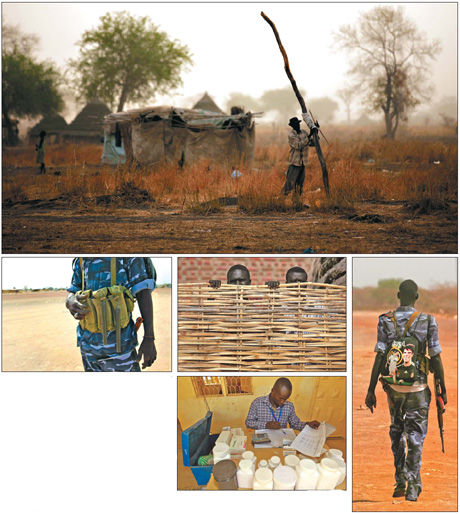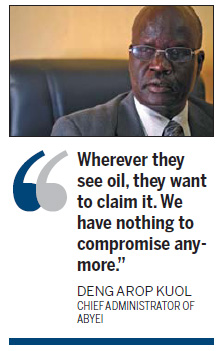Global General
Fear on the horizon at dawn of a nation
By Zhang Haizhou (China Daily)
Updated: 2011-04-21 08:42
 |
Large Medium Small |
 |
|
Clockwise from top: A villager carries a log in the early morning in Abyei, Sudan. A solider on patrol in Abyei. An employee checks medicines at the only clinic in Abyei, which is run by Irish international humanitarian agency GOAL. Two residents of Abyei, who have just returned from north Sudan, look cautiously from behind a fence. A soldier is armed with nunchucks. [Photo/China Daily] |
Deep trauma
The war has left Abyei in a deep trauma. It is now a place with little economic activity or schooling and no basic infrastructure.
The regional population is estimated at 150,000 to 200,000. In Abyei town it is about 50,000.
There is one main street and a market in the town. Almost all the restaurants, shops, pharmacies, and groceries are in shacks.

The region has no public electricity or water supply. There is always a long line of people with plastic barrels at the only well on the town's main street.
Those who do not have the money to open a small business support themselves bartering durra, a locally grown sorghum crop, for livestock.
Though many in southern Sudan are optimistic about the future of their new country after July 9, the authorities in Abyei have more to worry about.
About 37,000 internally displaced people (IDP), due to Sudan's split, have returned to Abyei from the north, according to Mario Kuol, acting minister of agriculture, fishery and livestock of the region.
"They need facilities and services. They are supposed to reside in Abyei, but they have no shelter. Some of them live under trees," Kuol said.
Many of them do not have a roof over their head. A piece of grassland, through which a small river runs, has now become a shelter for war refugees and IDPs.
Abyei is also a town where many people do not know their exact age, as there is no hospital where women can give birth.
A middle-aged man named Kat, meaning "run" in the Ngok-Dinka language, said all he knew was that he was born when his mother was fleeing the war decades ago.
The only clinic in Abyei, run by Irish international humanitarian agency GOAL in a single-story brick building, lies on the grassland.
Deng Mayal Kur is the only doctor there. He said he has a very busy schedule every day, with some people traveling as far as 50 km for treatment.
But Kur's major problem is that there is nowhere in the clinic for him to perform even the simplest surgical procedures on patients, many of whom come to him with bone fractures resulting from the conflict.
In that case, he has to refer those patients to a hospital dozens of kilometers away.
"Sometimes this is very dangerous", as the transfer would not only delay treatment, but also put patients in danger on the extremely bumpy road.
Though the conditions are very trying, Kur said he has no plans to leave.
"I hope everyone in Abyei can soon enjoy peace, clean water and better healthcare facilities."
But peace still seems a very long way off in this town, where the atmosphere appears to be thick with hatred.
At a refugee shelter, a toddler proudly showed off his toy, a wooden rifle.
Sudanese President Omar al-Bashir insisted recently that the Abyei problem cannot be solved without the Misseriya participating in the referendum.
Apart from the Misseriya, south Sudan also blamed the north for dispatching Popular Defense Forces, part of the Sudanese army, to fight in the region.
But the Sudan People's Liberation Army is also there on the front line.
In this atmosphere of finger-pointing and accusation, talks between al-Bashir and the south's leader, Salva Kiir Mayardit, broke down in mid-March.
After international mediation, the talks restarted in late March, aimed at reaching a settlement on a wide range of issues including citizenship, the status of Abyei and shares of oil resources. No progress has been made so far.
The Ngok-Dinkas think oil is the main reason the north is so interested in controlling Abyei.
They also accuse the central government in Khartoum of supporting the Misseriyas and offering them weapons, an allegation Khartoum firmly denies.
'Oil-rich'
"Wherever they see oil, they want to claim it," said Deng Arop Kuol, the chief administrator of Abyei under the government of south Sudan. Kuol also said there are 25 wells around the village of Kech/Diffa, about 50 km to the north of Abyei.
Sudan is the third-largest oil-producing country in sub-Saharan Africa, and about 80 percent of the precious resource lies in the south. Sudan currently produces around 500,000 barrels a day.
It is unclear precisely how much of Sudan's oil is in Abyei, with estimates ranging from 2 to 11 percent.
Leben Nelson Moro, an expert on oil studies at the University of Juba, said oil is "a big issue", as it may delay demarcation between the north and the south.
More than 80 percent of the north-south border has already been demarcated, according to the government of south Sudan.

But the process is not finished in Abyei.
"Where there's no oil, it is demarcated. Where there's oil, it's not done," said Moro, who believes more oil will be discovered in the region.
Part of Abyei lies in blocks 1, 2 and 4 of Sudan's oil fields. The blocks cover an area that straddles the north and the south.
Production began in 1996 with the development of the Heglig and Unity fields. In September 1999, the first cargo of crude left the export terminal.
In 2009, the combined production from blocks 1, 2 and 4, including Abyei, was estimated to be around 180,000 barrels a day of Nile blend, reflecting a decline from a 2006 peak of over 270,000 barrels a day. It is expected to continue to decline in the short term.
"The negotiations over the future of these fields and the Abyei region have delayed investments to offset declines," according to the Eurasia Review website.
A high official of an overseas oil firm that operates in the blocks, however, told China Daily in Juba that the amount of oil in Abyei "can be neglected".
| 分享按钮 |